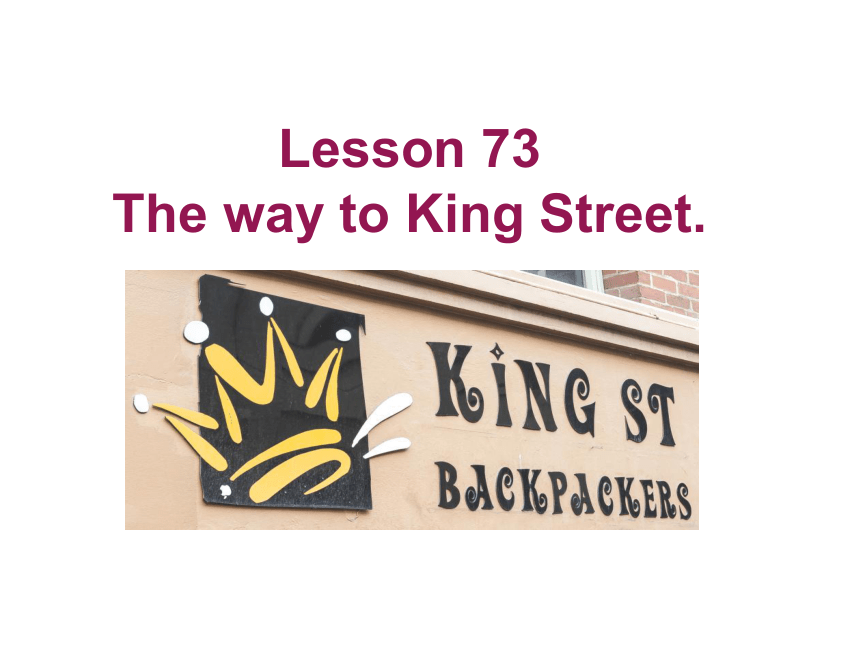(
课件网) Lesson 73 The way to King Street. week n周,星期 London n伦敦 suddenly adv突然地 bus stop 公共汽车站 smile v微笑 pleasantly adv愉快地 understand-understood v懂,明白 speak-spoke v讲,说 hand n手 pocket n衣袋 phrasebook n短语手册 phrase n短语 slowly adv缓慢地 单词讲解 week [wi:k] n. 周 day日 month月 year年 on weekday at the weekend weekday n.平日 weekend n.周末 suddenly adv.突然地 sudden adj. 突然的,意外的 Suddenly, she saw a man near a bus stop. 突然,她在公共汽车站附近看到一个男人。 smile [smail] v.微笑 laugh 大笑 laugh at嘲笑 understand v.懂 过去式:understood I did not understand English. 我不懂英语。 speak v. 说 speak +语言 speak English French Chinese Japanese London 倫敦塔Tower of London 伦敦塔桥 give sb. a hand hand in hand hand n.手 帮忙,帮助 手拉手 green hand 生手 go v. 走 go home go to school go to the park go to bed 课文 Last week Mrs Mills went to London. She does not know London very well, and she lost her way. Suddenly, she saw a man near a bus-shop. “ I can ask him the way.” She said to herself. “Excuse me,” she said. “Can you tell me the way to King Street please ” The man smiled pleasantly. He did not understand English! He spoke German. He was a tourist. Then he put his hand into his pocket, and took out a phrase-book. He opened the book and found a phrase. He read the phrase slowly. “I am sorry,” he said. “ I do not speak English.” ask and answer What did Mrs. Mills do last week She went to London. Does she know London well No, she doesn’t. What happened to her (Did she lose her way ) She lost her way. Where did she see a man She saw a man near a bus stop. What did she say to him She said, ’Excuse me .Can you tell me the way to King Street ,please ’ Did the man smile Yes, he did .He smiled pleasantly. Did the man understand English No, he didn’t. What did the man do He put his hand into his pocket and took out a phrasebook. Did he speak English No, he didn’t. Was he a tourist Yes ,he was. 课文分析时间 任务一: 分析每一句话是什么时态 一般现在时? 一般过去时? 一般将来时? 现在进行时? why 一般现在时 标志词:频率副词always/sometimes/never 动词原形: am/is/are/动词原形/动词+s/es 一般过去时 标志词:last。。。;。。ago ; yesterday;。。 动词形式: was/were/动词过去式(ed) 一般将来时 标志词:next。。; tomorrow , in+段时间(在。。之后) 动词形式: will +动词原形 am/is/are going to +动词原形 现在进行时 标志词: now=at the moment , look ,listen 动词形式: am/is/are+ 动词ing 任务二: 找出文中的重点短语 迷路 问路 心中暗想 去。。的路 说德语 拿出 speak German the way to .. say to oneself ask the way lose one’s way take out 找 连 背 任务三: 来观察 形容词还是副词 形容词 (翻译成”…的”) 用来修饰名词,表示人或事物的性质和特征,一般放在它所修饰的名词前。 He has a round face and a small nose. His eyes are very big and blue. He runs slowly. The picture is very beautiful. Suddenly, he saw a man near the bus-stop. 副词 (翻译成”…地”) 用来修饰动词、形容词、 ... ...

